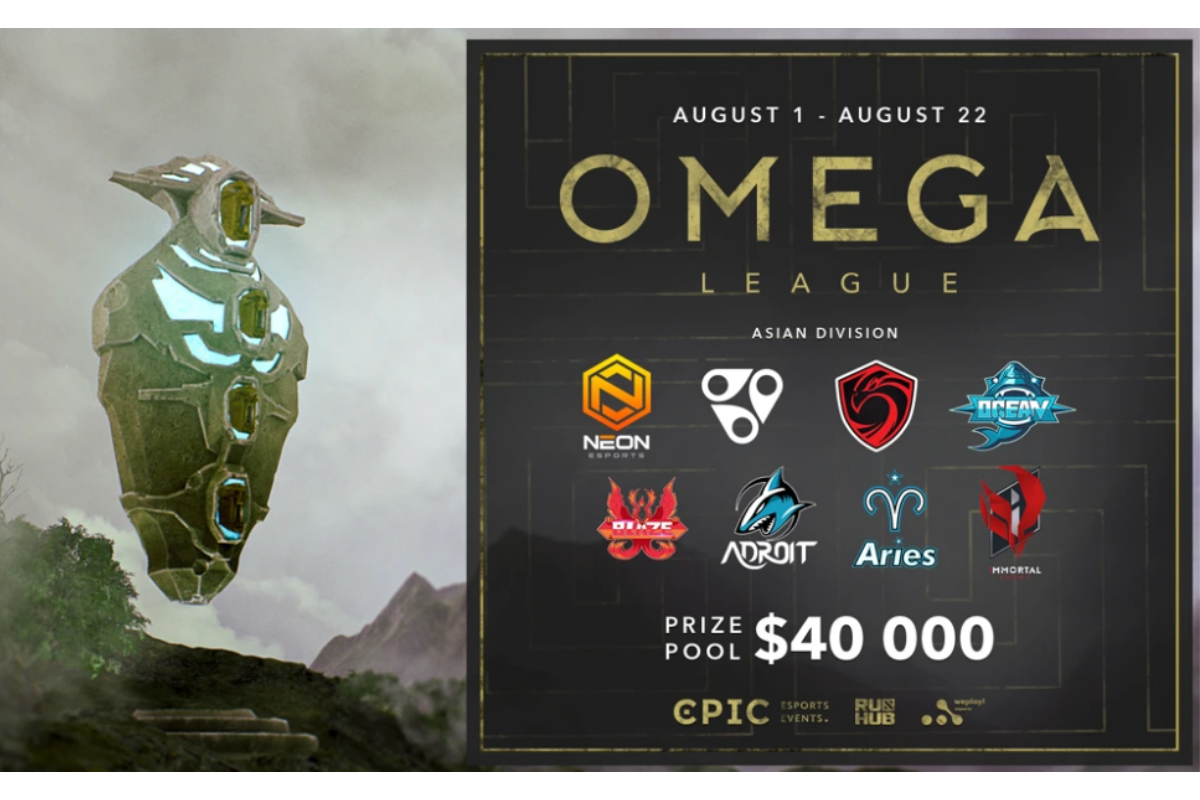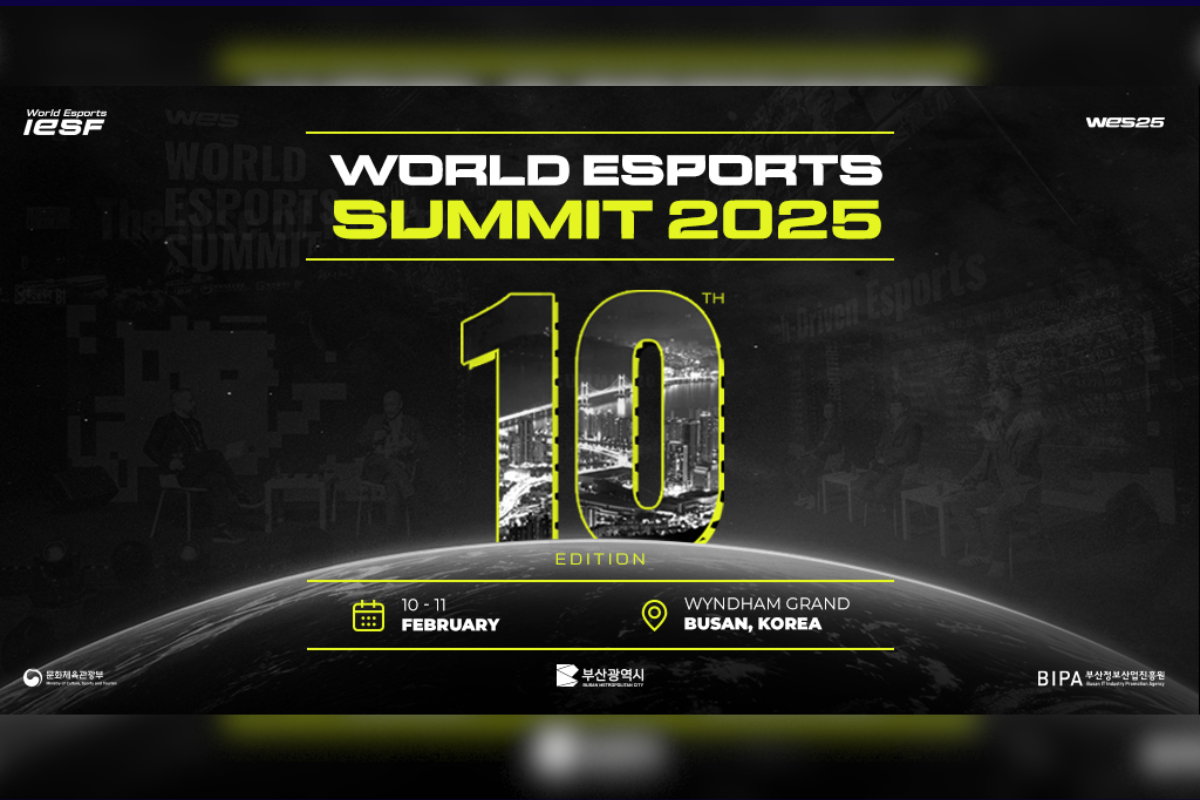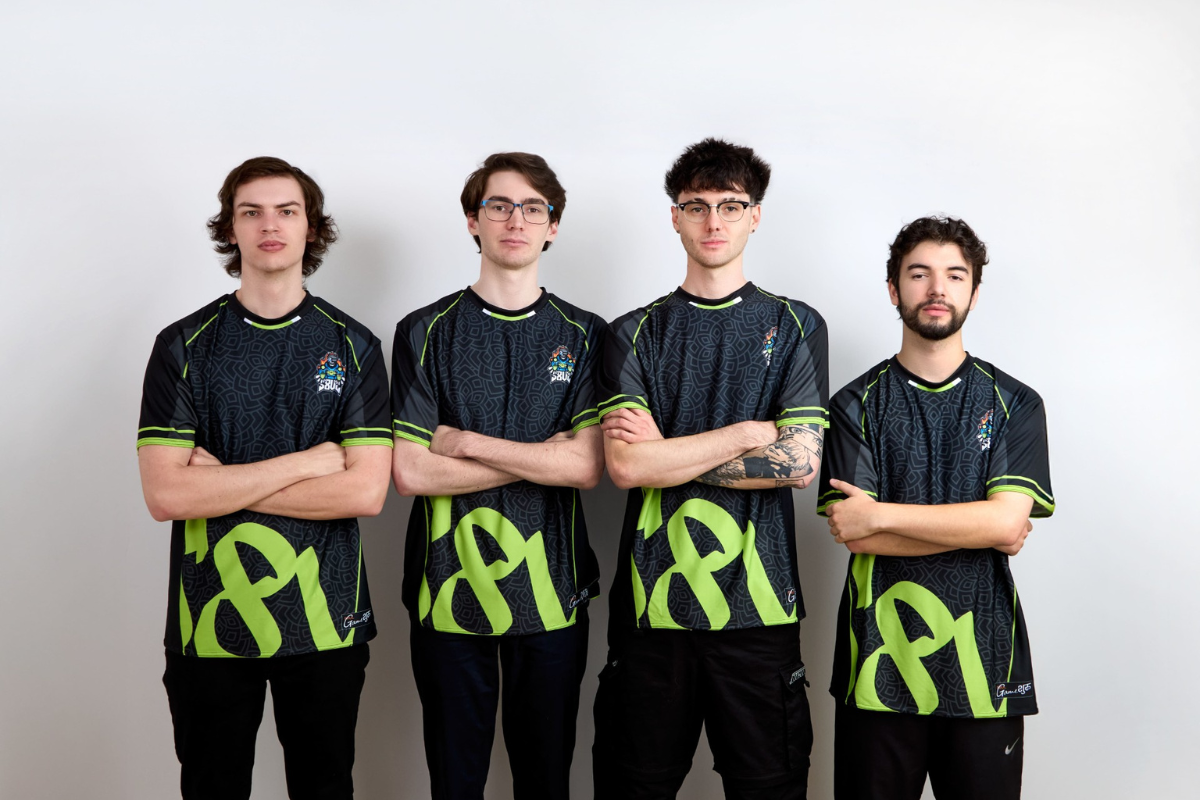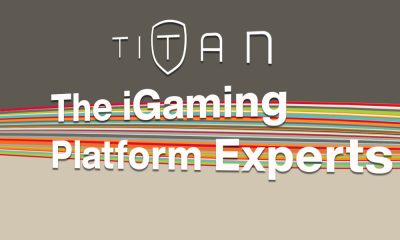Asia
OMEGA League expands to Asia

New Asian region that will include players from China and SEA
“We announced OMEGA League last week, and it included both European and American regions. Today we are happy to report that the players from China and SEA will also be a part of this event. With the remaining two competitive regions joining the fray, OMEGA League becomes truly global.”
– Anton “WarLocK” Tokarev, Lead Esports Manager at WePlay! Esports
“As we mentioned, we want to make this August unforgettable for all Dota 2 fans. And we just can’t imagine any International without one of the strongest regions! Together with WePlay! Esports, we got the best teams from three biggest parts of the world to bring you even more breathtaking emotions!”
– Mark Averbukh, representative of Epic Esports Events
Asia format
Asia consists of Divine Division formed by two groups of six teams each.
Twelve teams will participate in the group stage of Divine Division. They will be divided into two groups of six (separate groups for the Chinese and SEA teams). Each group will see teams play each other in a BO3 series.
The two best teams from each group advance to Divine Playoffs Upper-Bracket Round 1.
The teams that take third place advance to Divine Playoffs Lower-Bracket Round 1
The teams that take fourth and fifth place will enter the Play-in Stage to fight for two more Divine Playoffs Lower-Bracket Round 1 seeds.
Divine Playoffs is a double-elimination bracket. All matches are BO3, and Grand Finals are BO5.
The rest of the teams are eliminated from the tournament.
The group stage for the Asia region will take place on August 01 – 10. The Playoffs will be held on August 12 – 22.
The participants
Teams from the Chinese competitive region:
Ocean
Blaze
EHOME.Immortal
Aster.Aries
Open Qualifier winner #1
Open Qualifier winner #2
Teams from the SEA competitive region:
Neon Esports
Reality Rift
Adroit
Cignal Ultra
Open Qualifier winner #1
Open Qualifier winner #2
SEA Open Qualifiers:
Southeast Asia #1
Southeast Asia #2
Southeast Asia #3
Southeast Asia #4
Countries that represent the subregion: Singapore, Thailand, Vietnam, Laos, Malaysia, Cambodia, Myanmar, Philippines, Indonesia, Bangladesh, India, Pakistan, Nepal, Sri Lanka, Japan, Taiwan, South Korea, Mongolia, Australia, New Zealand.
Dates
July 25 – July 28. ROUND 1 — Root Leagues
July 29 – July 30. ROUND 2 — Subregional Playoffs
Format
Open Qualifiers Root Leagues
Teams will be eligible to play in any and every single-elimination (BO1) bracket. The four best teams from each tournament will go to the second round of qualifiers (the exact rating of the teams will determine the finals of the starting bracket and the match for third place).
Open Qualifiers Subregional Playoffs
The sixteen teams from each subregion will form one single-elimination bracket. All matches are BO3. Teams that take first and second place advance to Divine Division (the SEA group).
The rest of the teams are eliminated.
Subregional Playoffs prize pool:
1st place – Divine Division seed + five gaming sets of three gaming devices
2nd place – Divine Division seed + five gaming sets of two gaming devices
3rd place – five gaming devices
4th place – five gaming devices
Details regarding Open Qualifiers in the Chinese competitive region will be announced separately.
Asia Divine Division prize pool and distribution
The prize pool of Asia Divine Division is $40,000. It will be distributed as follows:
1st – $14,000
2nd – $7,500
3rd – $5,000
4th – $3,500
5th – $2,000
6th – $2,000
7th – $1,500
8th – $1,500
9th – $1,000
10th – $1,000
11th – $500
12th – $500
General OMEGA League prize pool update
The winners of Open Qualifiers from CIS, Europe, South America, and North America will be provided with $20,000 worth of gaming gear. Together with the added prize pool of the Asian region, the total prize pool of OMEGA League is $650,000.
Powered by WPeMatico
Asia
World Esports Summit Celebrates Its 10th Edition in Busan

The World Esports Summit returns to Busan, South Korea, for its 10th edition, taking place on 10–11 February 2025.
Hosted at the Wyndham Grand Busan, the Summit will bring together 40+ speakers from the international esports ecosystem, including representatives from federations, publishers, global brands, sports organizations, technology companies, and public institutions.
Over the past decade, the World Esports Summit has provided a platform for dialogue and cooperation among stakeholders shaping the world of esports. The 2025 edition will continue this role, offering space for discussion on current developments, industry challenges, and future directions.
The Summit will feature contributions from a wide range of organizations, including Alibaba, FIBA, FIFAe, Tencent, Moonton, NetEase, FIA, Sportradar, EFG, Good Game, Telekom, among others.
Across two days, participants will take part in keynote sessions and panel discussions addressing topics such as esports governance, international collaboration, industry development, integrity, and the continued convergence of esports and traditional sports.
Further information on the program, speakers, and registration is available on the official World Esports Summit website.
The post World Esports Summit Celebrates Its 10th Edition in Busan appeared first on Eastern European Gaming | Global iGaming & Tech Intelligence Hub.
Asia
Insurgence Gaming Company Expands Grassroots Vision with MOBA Legends 5v5 Discord Play-Ins

Following the launch of its inaugural women-focused VALORANT tournament La Imperia, the Insurgence Gaming Company has announced its second competitive initiative, MOBA Legends 5v5 Discord Play-Ins, a series of open community tournaments created to make organised competition more accessible to emerging players.
While La Imperia introduced a visibility-led invitational format, the MOBA Legends 5v5 Discord Play-Ins take a different approach. The series is built around open participation and will be hosted entirely online, with all tournament operations managed through Discord. This allows teams from across India to compete in a structured setting without the restrictions often associated with invite-only events.
The Play-Ins are designed as a starting point for players and teams who want to experience organised competition. Matches will be played in a 5v5 MOBA Draft Pick format, with scheduling, match reporting, and communication handled through dedicated Discord channels.
The announcement continues Insurgence Gaming Company’s early focus on grassroots esports. The company was created to address gaps in India’s competitive ecosystem, particularly at the amateur and semi-professional level where consistent tournament opportunities are still limited.
Speaking on the launch, Jasper Shabin, Founder of the Insurgence Gaming Company, said: “With La Imperia, we focused on visibility. With the Discord Play-Ins, the focus shifts to access. Competitive players need regular places to play, improve, and test themselves, not just one-off tournaments. MOBA Legends 5v5 is one of the most accessible competitive titles on mobile, which makes it a strong fit for an open, community-driven format.”
Beyond competition, the Discord Play-Ins are also intended to build a sense of continuity. Players will have access to channels dedicated to match coordination, tournament updates, and post-game discussion, helping teams stay connected beyond a single tournament run.
With the MOBA Legends 5v5 Discord Play-Ins, the Insurgence Gaming Company continues to shape its identity around community-first formats, pairing visibility-led initiatives like La Imperia with open competitive pathways that support long-term grassroots growth in Indian esports.
The post Insurgence Gaming Company Expands Grassroots Vision with MOBA Legends 5v5 Discord Play-Ins appeared first on Eastern European Gaming | Global iGaming & Tech Intelligence Hub.
ALGS 2026 Championship
S8UL Esports secures historic top five finish at ALGS 2026 Championship; bags INR 1 crore in prize money

S8UL Esports, a global powerhouse in esports and gaming content, delivered a landmark performance by finishing among the top five teams globally at the Apex Legends Global Series (ALGS) 2026 Championship, held in Sapporo, Japan from January 15 to 18. This result represents the best ever finish by an Indian organization on the Apex Legends global stage, setting a new benchmark for Indian esports at the highest level of international competition.
The ALGS 2026 Championship, the crowning event of the Apex Legends competitive calendar, brought together 40 of the world’s most consistent and high-performing teams from the year-long global circuit. S8UL’s all-Australian roster featuring Rick Wirth (Sharky), Benjamin Spaseski (Jesko), and Tom Canty (Legacy), led by head coach Harrison Rogers (Rogers), delivered a standout campaign and emerged as the only South Asian team to secure a Top 5 finish at the premier international Apex Legends event. The team earned USD 120,000 (approximately INR 1 crore) from the tournament’s USD 2,000,000 (approximately INR 18.14 crore) total prize pool.
Commenting on the achievement, Animesh Agarwal, Co-founder and CEO, S8UL, said, “Over the years, we have built one of India’s strongest gaming creator ecosystems and a solid foundation in content. In the last 18 months, we have deliberately expanded our focus to global esports investments across multiple titles, and performances like this validate that vision. Our ambition is to compete and win at the highest level worldwide. We are investing deeply, assembling world-class international rosters, and representing S8UL on the global stage from India. A top five finish at ALGS is a major milestone, and it marks only the beginning of what we believe will be a very strong future for S8UL in esports.”
S8UL began their campaign in Group B, navigating a demanding round-robin stage where all 40 teams were divided into four groups of 10. The team’s consistent performances saw them finish among the top 20 teams, earning a spot in the Winners Bracket and keeping them firmly in title contention.
From there, S8UL qualified for the Grand Finals, where the remaining 20 teams competed under the high-pressure Match Point Format. Under this system, a team must reach 50 points and then secure a match win to claim the championship, with the remaining teams ranked by total points. Across nine final matches, S8UL accumulated 64 points to finish fifth overall, just one point behind fourth-placed GROW Gaming, underlining how closely contested the championship was.
“The margins at this level are extremely fine, and the team showed tremendous composure throughout the tournament. From the group stage through to the finals, the players displayed adaptability, trust, and resilience. Finishing in the top five globally is a major milestone, and it reinforces our confidence in this roster’s ability to contend for championships in the future,” commented Harrison Rogers, coach of S8UL’s Apex Legends team.
S8UL’s performance at the ALGS 2026 Championship builds on the organisation’s growing presence in international Apex Legends competition. In 2025, S8UL competed at the ALGS Midseason Playoffs as part of the Esports World Cup in Riyadh, where the organisation also became the first Indian team to be selected as a Club Partner for the tournament. With consecutive appearances at Apex Legends’ premier global events, S8UL continues to establish itself as a consistent contender on the world stage and a flagbearer for Indian esports internationally.
The post S8UL Esports secures historic top five finish at ALGS 2026 Championship; bags INR 1 crore in prize money appeared first on Eastern European Gaming | Global iGaming & Tech Intelligence Hub.
-

 Edvardas Sadovskis CPO at ICONIC217 days ago
Edvardas Sadovskis CPO at ICONIC217 days agoICONIC21 Reimagines Myth: Medusa vs. Perseus — The Stone Duel
-

 Africa7 days ago
Africa7 days agoAmusnet Announces Strategic Partnership with Betway
-

 Canada7 days ago
Canada7 days agoGaming Corps takes flight in Ontario with High Flyer Casino partnership
-

 CRM7 days ago
CRM7 days agoTitan 3.0 Launch Marks Finnplay’s Biggest Platform Overhaul
-

 Christer Fahlstedt6 days ago
Christer Fahlstedt6 days agoPaf has halved its loss limit since 2018
-

 Canada7 days ago
Canada7 days agoCasinoCanada and GG.BET Forge Strategic Alliance
-

 Latest News6 days ago
Latest News6 days agoWinSpirit’s UnValentine’s Day: A New Take on February Engagement
-

 AGLC7 days ago
AGLC7 days agoContinent 8 set to back Alberta’s iGaming operators and suppliers

















